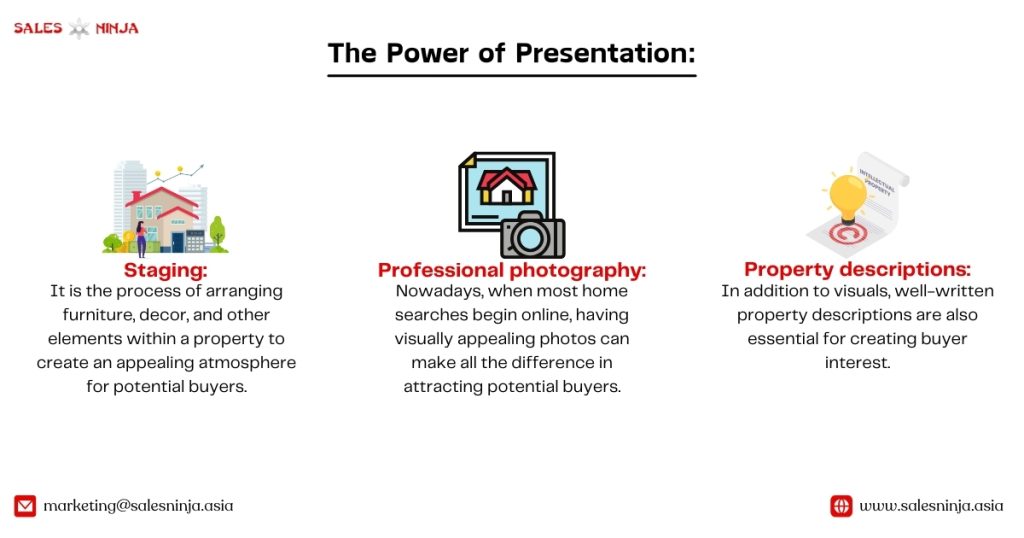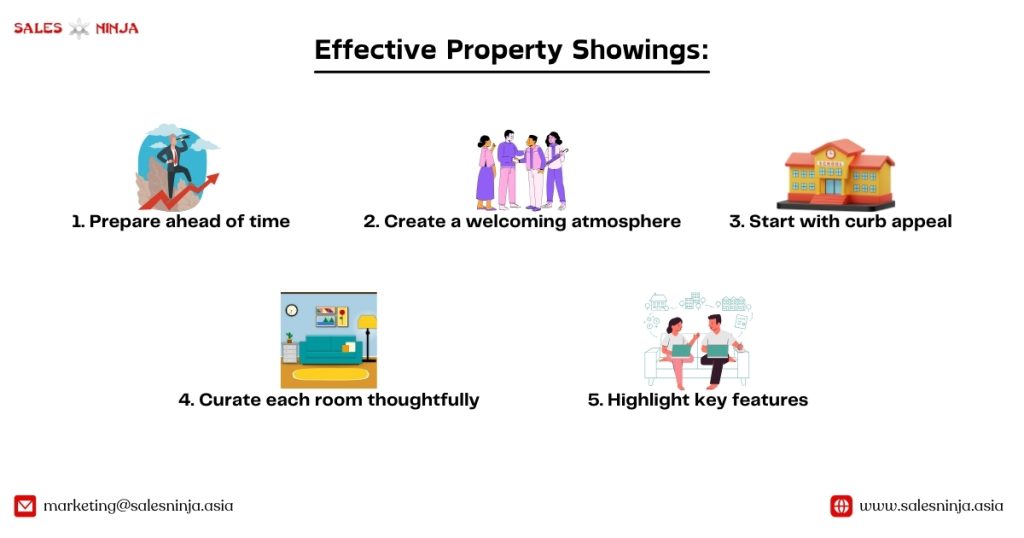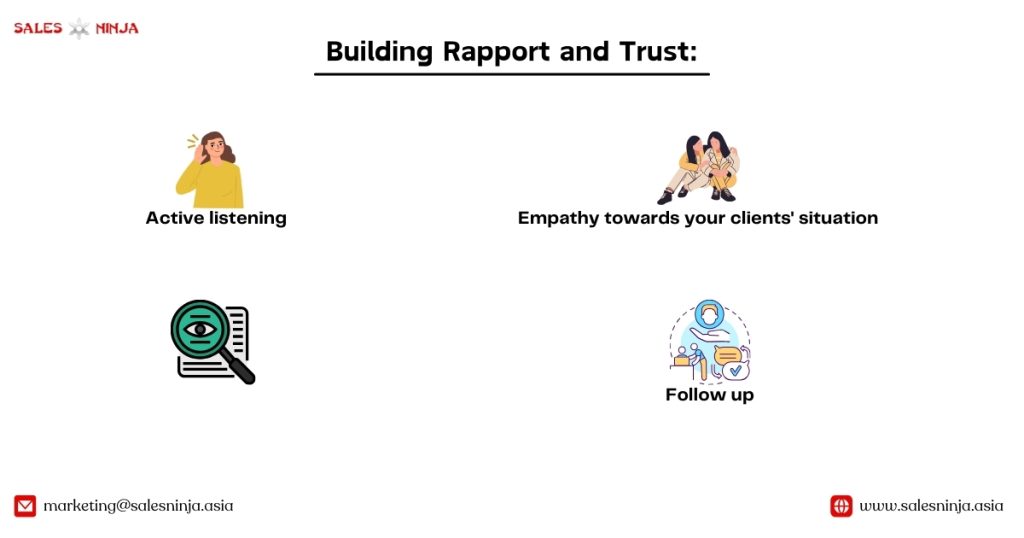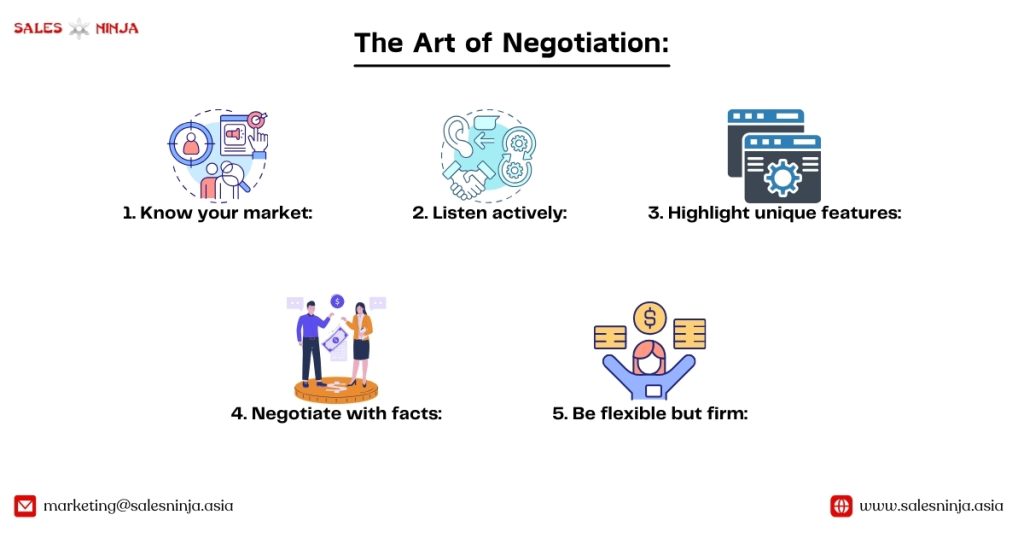In the property sales industry, effective sales techniques for property selling have a profound impact on its outcomes. Even a mere 1% increase in closing techniques can boost final sales prices by up to 9%! Since selling real estate entails much more than just business dealings, this industry needs more than just simple sales strategies. In this case, sellers must employ a level of strategy and human insight that goes above and beyond what is typically required because potential customers must be actively engaged. Therefore, to succeed in the current market, real estate professionals must possess strategic sales skills.
Key Success Factors in Property Selling
As we have said, real estate professionals must equip themselves with strategic sales skills, but before they can master these skills, they must understand the key success factors in property selling. The foundation for success rests upon three pillars:

Understanding Market Dynamics:
Market dynamics refer to the changing conditions and trends within the real estate industry. These include fluctuations in supply and demand, changes in interest rates and housing policies, as well as shifts in consumer preferences and behavior.
Real estate professionals who can stay updated on current market conditions will be better equipped to advise their clients on pricing strategies and make informed decisions about when to buy or sell a property. This requires constant monitoring of local markets and keeping up-to-date with national economic indicators that could impact the industry.
In addition, understanding market dynamics also involves being aware of the different types of properties available (such as single-family homes vs apartments) and their respective target demographics. For example, if there is an influx of young families moving into a specific area due to new job opportunities, this could indicate a growing demand for larger-family homes.
Furthermore, knowing how certain events or developments may affect property prices can give real estate professionals an edge over their competitors. For instance, if there is news of a major company relocating its headquarters near a particular neighborhood, this could boost home values in that area.
The Power of Presentation:
In real estate, it refers to the various tactics and techniques used by professionals to showcase a property in its best light. This includes staging, professional photography, and compelling property descriptions.

- Staging: It is the process of arranging furniture, decor, and other elements within a property to create an appealing atmosphere for potential buyers. By strategically placing items and enhancing the visual appeal of a space, staging can make a property feel more inviting and increase its perceived value. It allows buyers to envision themselves living in the space, which can be a powerful selling point.
- Professional photography: Nowadays, when most home searches begin online, having visually appealing photos can make all the difference in attracting potential buyers. Professional photographers have specialized equipment and skills that allow them to capture stunning shots that highlight key selling points such as natural lighting, unique architectural details, or spacious layouts.
- Property descriptions: In addition to visuals, well-written property descriptions are also essential for creating buyer interest. A compelling description should not only provide factual information about the property but also evoke emotion and imagination from readers. It should paint a picture of what it would be like to live in the space while highlighting any unique features or amenities that set it apart from others on the market.
Combined, these presentation techniques have a significant influence on how buyers perceive a property. They help create an emotional connection between potential buyers and their future home, leading them toward making an offer.
Moreover, presenting properties professionally instills confidence among clients who entrust their valuable assets to real estate professionals, knowing they will do everything possible to maximize their sale price through effective marketing strategies, including presentations tailored specifically to keep the target audience in mind.
Overall success factors for successful sales include understanding client needs/preferences/budgets; being able to anticipate customer concerns/questions/objections before they arise so one has ready answers/solutions during negotiations (i.e., pricing issues); maintaining a high level of professionalism throughout the process; and above all, understanding that every property is unique and requires a customized strategy for optimal presentation to potential buyers.
Client-Centric Approach:
This approach emphasizes understanding and catering to the needs, motivations, and potential concerns of clients. In this highly competitive industry, simply listing a property and waiting for buyers is not enough. Rather, real estate professionals should proactively engage with their clients and understand what they are looking for in a property.
Each client has unique preferences and requirements when it comes to buying or investing in a property. Real estate professionals gain insights into why their clients want to purchase or invest in particular types of properties, as well as what might be holding them back from making decisions. Understanding client motivations allows agents/salespersons/consultants to tailor their sales pitches accordingly. For example, if an investor is primarily concerned about generating high returns through rental income rather than reselling the property at a higher price after renovation/upgrades then listing out features like location advantages & nearby amenities could help seal the deal.
Furthermore, by being attentive to potential concerns expressed by clients during discussions – whether it’s regarding budget constraints or maintenance issues – real estate professionals can address those concerns and provide suitable solutions.
It should be noted that this Client-Centric approach shouldn’t end once the transaction is complete; instead, maintaining good communication even after closing deals creates loyal customers who may become repeat buyers/investors themselves while referring friends/family/colleagues/business acquaintances too! Happy customers go a long way toward building a positive reputation, which can ultimately lead to more business opportunities.
Essential Sales Techniques for Property Selling
As mentioned earlier, effective communication and building relationships are key components of closing deals in this industry. However, before any sale can even take place, it is important to have potential buyers lined up through prospecting and lead generation – both crucial aspects of successful sales techniques for property selling.
Prospecting and Lead Generation:
Prospecting refers to the act of identifying potential buyers who may be interested in purchasing a property. This process involves researching demographics, target markets, and specific buyer preferences to create a list of qualified leads. To effectively prospect for potential buyers, one must understand their needs and motivations when looking for properties.
Online methods play an integral role in both prospecting and lead generation. With the rise of social media platforms such as LinkedIn, Facebook, and Instagram, real estate agents can reach out to their network or run targeted ads to attract potential buyers. Utilizing search engine optimization (SEO) strategies on company websites also helps drive organic traffic from individuals searching for properties online.
However, offline methods should not be disregarded either as they still hold importance in reaching out to potential buyers. Traditional marketing tactics like direct mail campaigns or hosting open house events are great ways to connect with prospects face-to-face and showcase available properties.
Building relationships with other professionals within the industry is another valuable way to generate leads through referrals. Real estate agents often work closely with mortgage brokers or home inspectors who may refer clients looking for properties that match your listings.
Effective Property Showings:
One of the key aspects of being a successful salesperson in the property selling industry is conducting effective property showings. Not only do these showings allow potential buyers to see the property for themselves, but they also allow you as the salesperson, to highlight its unique advantages and features.

To make your property showings truly impactful, here are some essential sales techniques for property selling that every salesperson should keep in mind:
- Prepare ahead of time: Before conducting any showing, it’s important to thoroughly prepare yourself and the property. This includes familiarizing yourself with all relevant information about the property such as its history, specifications, and current market value. It’s also crucial to ensure that the property itself is clean and presentable.
- Create a welcoming atmosphere: First impressions matter greatly when it comes to showcasing a property. Make sure that upon entering, potential buyers feel welcomed by creating a warm and inviting atmosphere. This can be achieved through simple touches like playing soft music or lighting scented candles.
- Start with curb appeal: The exterior of a house is often what catches someone’s eye first, so make sure it leaves a positive impression on potential buyers before they even step inside.
- Curate each room thoughtfully: As you move from one area of the house to another during your showing, carefully curate each space according to its purpose (e.g., bedrooms should look cozy while kitchens appear functional). Consider using furniture placements or staging props like throw pillows or table settings to help showcase how spaces can be utilized effectively.
- Highlight key features: Every home has something special about it – whether it’s high ceilings or original hardwood floors – so don’t forget to point out these unique selling points during your tour! By highlighting specific details throughout your showing, you’ll help potential buyers envision themselves living there more easily.
Remember to always prepare thoroughly and make each showing a memorable experience for potential buyers!
Building Rapport and Trust:
Building rapport and trust allows potential clients to feel comfortable with you and creates a foundation for open communication and collaboration throughout the sales process. This is essential when utilizing effective sales techniques for property selling.

One effective strategy for quickly establishing positive relationships is active listening. This means actively paying attention to what your client is saying, rather than just waiting for your turn to speak. By showing genuine interest in their needs, concerns, and preferences, you can build trust and understanding right from the start.
Another important aspect of building rapport is demonstrating empathy towards your clients’ situations. Selling or buying a property can be an emotional experience for many individuals, so it’s crucial to acknowledge their feelings and show support while remaining professional.
Maintaining credibility is also key when it comes to building trust with potential buyers or sellers. Be transparent about any information related to the property or transaction that could affect their decision-making process. Honesty goes a long way toward earning someone’s confidence.
Additionally, make sure all promises made are kept promptly as this builds reliability on your part. If there are any delays or complications during the sales process, communicate openly with your client instead of ignoring them. Being proactive will help maintain credibility even in challenging situations.
Lastly, always follow up after each interaction with prospective clients by sending personalized messages expressing gratitude for their time spent meeting with you or providing feedback on the properties shown. These small gestures demonstrate professionalism and commitment, which further strengthen relationships built on mutual respect and trust.
Mastering Sales Techniques in Property Selling
You’ve crafted a compelling listing, attracted potential buyers, and built strong client relationships. However, even the most promising sale can be derailed by objections. Mastering the art of handling objections with skill and confidence is therefore essential for turning hesitant buyers into successful closings, and a cornerstone of successful sales techniques for property selling.
Overcoming Objections:
Every property sale is unique, but some objections are common obstacles that can arise during the process. Being prepared with clear and persuasive responses gives you the upper hand in negotiations and helps you maintain momentum toward a successful closure.
Here’s how to handle some of the most common objections in property selling:
Objection: “The price is too high.”
Reframe the conversation. Focus on the property’s value rather than just the price. Highlight comparable sales in the area, the property’s unique features, and the potential return on investment.
Be transparent. Show them the numbers and how you arrived at the listed price. If there’s room for negotiation, discuss offering concessions such as seller-paid closing costs or repairs up to a certain amount.
Objection: “The property needs too much work.”
Acknowledge their concerns. Validate their observations and show empathy. Offer suggestions on updates with the potential to increase value.
Help them visualize how the property could look with some cosmetic or minor renovations.
Objection: “The location isn’t right for us.”
Dig deeper. Find out what their specific concerns are about the location. Highlight nearby amenities. Emphasize local attractions like good schools, parks, transportation hubs, etc. that might appeal to them.
Present the location as fitting a particular lifestyle they’re aspiring towards (quiet, family-friendly, walkable to restaurants, etc.).
Remember:
- Anticipate objections in advance. Think about potential concerns buyers might have about a property and prepare your responses beforehand.
- Maintain a calm and confident demeanor. Don’t get defensive when handling objections; remain solution-oriented and focus on collaboration.
- Use your knowledge. Demonstrate your expertise by offering insightful market data and potential solutions to help overcome their hesitation.
The Art of Negotiation:
Another of the most essential aspects of successful property selling is the art of negotiation. Negotiation plays a significant role in the property-selling industry. As it allows both parties involved – sellers and buyers – to reach an agreement that meets their needs. However, negotiating can be challenging, especially when emotions are high or when there are multiple offers on a property. That’s why it’s important to have effective tactics in place to navigate through negotiations smoothly.

Here are some top sales techniques for mastering the art of negotiation in property selling:
- Know your market: Before entering into any negotiation, make sure you understand your local real estate market well. This includes knowing recent trends and prices of similar properties in the area. Having this knowledge will give you leverage during negotiations and help you justify your asking price.
- Listen actively: During negotiations, listening is just as important as speaking. Make sure you listen carefully to what each party wants and take notes if necessary so that you can address their concerns effectively later on.
- Highlight unique features: To convince potential buyers that your property stands out from others on the market, highlight its unique features during negotiations. This could include things like location advantages or special amenities within the neighborhood.
- Negotiate with facts: Rather than relying solely on emotions or opinions during negotiations, use concrete data and facts. Such as recent home sale prices or improvements made to the property to support your arguments.
- Be flexible but firm: Negotiations often involve some back-and-forth between parties until an agreement is reached. Sellers need to be open-minded and willing to compromise while also standing firm on non-negotiable terms such as closing dates or certain conditions.
Creating a Sense of Urgency:
One of the most effective strategies to close deals quickly and efficiently is by creating a sense of urgency. Creating a sense of urgency does not mean pressuring potential buyers or using manipulative tactics. Instead, it involves ethically generating a feeling of importance and time sensitivity. That encourages timely closings without compromising trust or integrity. These tactics are a crucial part of strategic sales techniques for property selling.
One way to create a sense of urgency is through scarcity. By highlighting limited availability or exclusive features, you can show potential buyers that they need to act fast if they want to secure their dream property. This tactic works particularly well when multiple interested parties are competing for the same property.
Another approach is through time-sensitive incentives such as discounts or bonuses for those who make an offer within a specific timeframe. This creates a win-win situation where both parties benefit – the buyer gets added value while the seller achieves timely closing.
Additionally, emphasizing market trends and projections can also instill a sense of urgency in potential buyers. For example, if interest rates are expected to rise soon, you can use this information to motivate buyers to make decisions before it’s too late.
However, it’s important not to overdo these tactics as they may come across as pushy and turn off potential buyers. The key here is balance – gently reminding them that opportunities like this don’t come often but still giving them enough space and time to make informed decisions.
Closing Thoughts: The Power of Strategic Sales
When it comes to selling property, one should adopt new methods instead of sticking to general ones. Knowing your market, and presentation, and building trust with clients is significant in achieving success in any business including real estate. Real estate professionals should have a grip on the best-proven methods of selling houses if they wish to excel. However, Sales Ninja is dedicated to empowering real estate professionals with the knowledge and strategies needed to excel. So, follow our website to receive additional insights into the effectiveness of strategic sales. Get in touch with us directly for business-specific professional sales training tailored to the real estate sector.






Leave A Comment